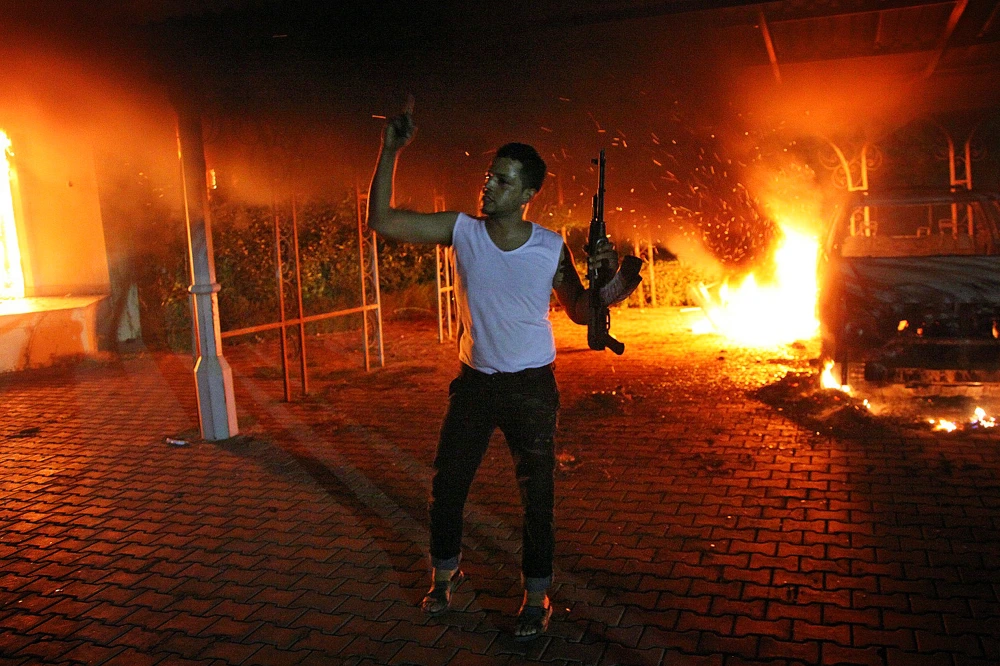In a fiery speech that has sparked widespread discussion, former Florida Attorney General Pam Bondi took to the national stage to address long-standing controversies surrounding Hillary Clinton, focusing on the 2012 Benghazi attack and the handling of classified emails during Clinton’s tenure as Secretary of State. The address, delivered at a conservative political conference and widely circulated online, has reignited debates about government transparency, accountability, and the legacy of one of America’s most prominent political figures. Bondi’s remarks, characterized by sharp rhetoric and pointed accusations, have drawn both praise and criticism, underscoring the polarized nature of contemporary political discourse.
The Benghazi Attack: A Focal Point of Criticism

Bondi’s speech began with a detailed recounting of the September 11, 2012, attack on the U.S. diplomatic compound in Benghazi, Libya, which resulted in the deaths of Ambassador J. Christopher Stevens and three other Americans. She accused Clinton, who was Secretary of State at the time, of failing to provide adequate security for the diplomatic mission despite repeated requests from Stevens and others. “The blood of those brave Americans is on her hands,” Bondi declared, citing congressional investigations that found lapses in security protocols.
The Benghazi attack has long been a lightning rod for criticism of Clinton’s leadership. A 2016 report by the House Select Committee on Benghazi concluded that the State Department, under Clinton’s direction, had been unprepared for the attack and slow to respond. However, the report also faced accusations of partisan bias, as Democrats argued it was designed to tarnish Clinton’s reputation ahead of her 2016 presidential campaign. Bondi’s speech leaned heavily on the committee’s findings, emphasizing what she described as a “pattern of negligence” that extended beyond Benghazi.
Critics of Bondi’s remarks argue that the Benghazi controversy has been thoroughly investigated, with no definitive evidence of criminal wrongdoing by Clinton. Eight congressional committees, including the House Select Committee, conducted inquiries, and Clinton testified for 11 hours in a public hearing in 2015. While security failures were acknowledged, no direct link was established between Clinton’s actions and the attack’s outcome. Nonetheless, Bondi’s speech framed Benghazi as emblematic of broader issues with Clinton’s judgment and accountability.
The Email Scandal: Allegations of Mishandling Classified Information
The second major focus of Bondi’s address was Clinton’s use of a private email server for official communications during her time as Secretary of State. Bondi described this as a “reckless and deliberate” attempt to evade transparency, accusing Clinton of endangering national security by storing classified information on an unsecured server. “She thought she was above the law,” Bondi stated, referencing the FBI’s 2016 investigation into the matter.
The email controversy, which dominated headlines during Clinton’s 2016 presidential campaign, stemmed from her decision to use a private server hosted at her home in Chappaqua, New York, rather than a government-issued email account. The FBI investigation, led by then-Director James Comey, found that 110 emails in 52 email chains contained classified information at the time they were sent or received, with eight chains containing top-secret information. However, Comey concluded that there was no evidence of intentional misconduct or criminal intent, and no charges were filed.
Bondi’s speech highlighted the FBI’s findings but framed them as evidence of Clinton’s unfitness for public office. She also pointed to subsequent revelations, such as the 2018 Inspector General report, which criticized the State Department’s handling of classified information under Clinton’s leadership. Bondi argued that these issues reflected a broader culture of secrecy and privilege within Clinton’s inner circle.
Defenders of Clinton have noted that the use of private email accounts was not uncommon among government officials at the time, including predecessors like Colin Powell. They also argue that the focus on Clinton’s emails was disproportionate, given that no significant breaches of national security were directly attributed to her actions. Nevertheless, the email scandal remains a potent symbol for critics, as Bondi’s speech demonstrated.
Social Media Amplification and Public Reaction
The viral spread of Bondi’s speech on platforms like YouTube and X highlights the enduring power of social media in shaping political narratives. Posts on X, such as one from @bluescritter on April 16, 2025, praised Bondi for “destroying Hillary Clinton with facts,” while others, like @ShaferJenn on April 22, 2025, echoed the sentiment, declaring, “It’s OVER!” These posts, which linked directly to the YouTube video, have contributed to its visibility, with view counts climbing steadily since its upload.

However, the reaction has not been universally positive. Some X users and commentators have criticized Bondi for rehashing old controversies, arguing that her speech serves more to energize a conservative base than to advance meaningful policy discussions. “Why are we still talking about Benghazi and emails in 2025?” one user wrote, reflecting a sentiment shared by those who view the speech as a distraction from current issues like economic recovery and climate policy.
The polarized response underscores the challenges of addressing historical controversies in a hyper-partisan environment. For Clinton’s supporters, Bondi’s speech is seen as an attempt to rewrite history for political gain. For her detractors, it represents a long-overdue reckoning for a figure who has remained influential despite her 2016 electoral loss.
Bondi’s Political Profile and Motivations
Pam Bondi, a former prosecutor and Florida’s first female Attorney General, has long been a prominent figure in conservative circles. Her tenure as Attorney General from 2011 to 2019 was marked by high-profile cases and a close alignment with Republican leadership, including former President Donald Trump. Bondi’s speech comes at a time when she is rumored to be considering a run for higher office, potentially as a U.S. senator or governor.
Analysts suggest that Bondi’s decision to target Clinton may be strategic, aimed at galvanizing conservative voters who remain skeptical of the former Secretary of State. By invoking Benghazi and the email scandal, Bondi taps into a well of resentment that has fueled Republican campaigns for over a decade. Her prosecutorial background lends credibility to her accusations, even as critics question the selective framing of her arguments.
Broader Implications for Political Accountability
Bondi’s speech raises broader questions about how political accountability is pursued and perceived in the United States. The Benghazi attack and the email scandal, while significant, occurred over a decade ago, yet they continue to shape public discourse. This persistence reflects both the depth of partisan divisions and the challenges of moving beyond polarizing figures like Clinton.
For some, Bondi’s address is a necessary reminder of the importance of transparency and responsibility in government. The deaths in Benghazi and the mishandling of classified information are seen as failures that demand ongoing scrutiny, particularly for a figure who may yet influence public policy. For others, the speech is a distraction, diverting attention from pressing issues like infrastructure, healthcare, and international relations.
The YouTube video of Bondi’s speech, hosted on a platform that reaches over 2.7 billion monthly active users, also highlights the evolving role of digital media in political accountability. Unlike traditional news outlets, which may filter or contextualize such remarks, YouTube allows unfiltered access to primary sources, enabling viewers to form their own conclusions. However, this accessibility comes with risks, as unverified claims and selective narratives can spread rapidly, as seen in the X posts amplifying Bondi’s speech.
Conclusion
Pam Bondi’s recent address has thrust the controversies surrounding Hillary Clinton back into the national spotlight, reigniting debates about Benghazi, classified emails, and government accountability. While her supporters view the speech as a courageous stand against perceived corruption, critics argue it is a politically motivated attempt to revisit settled issues. The viral spread of the speech on YouTube and X underscores the power of digital platforms to shape public perception, even as it highlights the challenges of navigating truth in a polarized era.
As the 2025 political season unfolds, Bondi’s remarks are likely to fuel further discussion about Clinton’s legacy and the broader state of American politics. Whether they lead to meaningful accountability or deepen existing divisions remains to be seen. For now, the speech serves as a stark reminder of the enduring impact of past controversies and the complex interplay of memory, media, and power in the public square.





